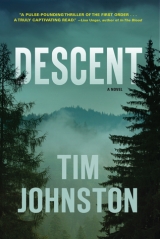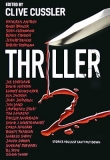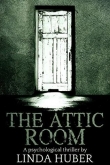
Текст книги "Descent"
Автор книги: Tim Johnston
Жанр:
Триллеры
сообщить о нарушении
Текущая страница: 17 (всего у книги 25 страниц)
47
Grant had reached the bottom step of the porch when the screen door pushed open and Emmet came backing out, an aluminum travel mug in his gloved hand. He saw Grant and stopped.
“You’re up early,” he said.
“So are you.”
“This ain’t early.” He gripped the railing and came carefully down the steps. He wore his good dark overcoat, dark slacks, black shoes, and the bright red cap pulled down over his ears. Gaining solid ground he looked up and met Grant’s eyes. “How’s that boy?”
“Sleeping it off.”
“How bad?”
“Not as bad as it looks. Two good shiners and a somewhat enlarged nose.”
“Broke?”
“What?”
“The nose.”
“No. Just the wrist. They put a cast on that.”
“I want you to give me that hospital bill, Grant.”
Grant waved this away. “It was just a scrap, Em.”
Emmet cocked an ear at him. “How’s that?”
“It was just a scrap.”
“If my dog gets loosed and kills a man’s chickens, is that man gonna come to me and say, don’t you bother, Emmet, it was just a scrap?”
“Not the most flattering analogy, Em.”
The old man cocked an ear at him again and Grant shook his head. He looked to the corner of the house where the tail end of the El Camino jutted. Emmet sniffed and looked at the sky.
“Why don’t you let me drive you, Em?”
“They ain’t took my license from me yet.”
“I know it. I feel like a drive myself.”
“What about the boy?”
“He’s fine,” Grant said. “He’s sleeping.”
WITHIN THE BORDER OF ponderosa pines were a few decorative birch trees, bare and white amid the stones. Grant got out to walk but there was no place in the cemetery from which he could not see the old man clearly, and he watched him trek through the snow until he reached a rose-colored stone of modest size and began to clear the snow from its crown, whisking left and then right, the way she must have once brushed snow or dander from his shoulders. When the stone was clean he pulled the cap from his head and rested upon the stone, his back to the graveyard, his fine white hair bristling.
Grant swept the snow from a bench and sat on the cold slats. The bench was aligned for a view to the north where on a clear day the mountains must be visible, rising above the hills, but this morning there was only the low thick clouds like a gray canopy over the world. In the corner of his eye he saw the old man at the stone. The white head nodding, cocking as if to listen, nodding again. Sipping his coffee. After a while the old man stood and turned and touched the stone once more and began walking toward Grant. Grant brushed more snow from the bench, and Emmet sat down beside him.
“Her folks are buried over in that corner there, where that birch is. She wanted to be closer, but them plots was bought up long ago.”
“It’s a nice spot she’s got,” Grant said.
“I bought the two plots for us and two more for the boys if they want them. If they don’t, they can sell them at a good profit.” He paused. “Twenty-five years ago that was, and I never once saw myself sitting here.”
Despite the cold and the snow there was the damp, moldering smell of the graves, or Grant imagined there was, and he took out his cigarettes unthinkingly, and then returned them to his pocket.
“Go ahead and smoke.”
“I can wait.”
“It ain’t gonna kill me.”
“That’s not what I hear.”
“That wasn’t the smokes, that was the goddam chemo.”
Grant brought out the cigarettes again and got one lit and blew the smoke well away, Emmet watching him closely. Emmet sniffed at the air. He sipped his coffee. Then he reached two gloved fingers casually toward Grant.
“What?” said Grant.
“Give a man a puff.”
“Forget it.”
“Come on now.”
“No.”
“One goddam puff, God damn it. Night I had.”
Grant looked into his eyes and handed over the cigarette.
Emmet sipped at the filter, held the smoke briefly in his lungs, and exhaled it slowly from pursed lips. He handed the cigarette back, grinned, and pitched forward on the bench coughing with such violence that Grant reached over and took hold of his arm.
“Em,” he said. He tossed the cigarette and began to pat the old man on the back, unprepared for the slightness of him under the coat, the racking thin basket of ribs and spine. “You need water,” he said, and Emmet shook his head and raised the travel mug, or attempted to—black gouts of coffee leaping from the sip hole before Grant reached to stabilize it, guiding it to the gray, contorted face. Emmet sipped, swallowed, sipped again. Grant let go of the mug and sat back again.
“Lord,” Emmet gasped, wiping at his chin. “Holy mother,” he said.
When the old man was quiet again, and a long moment beyond that, Grant leaned forward and said, “Want to say I’m sorry, Em. About last night. I don’t know what I was thinking.”
Emmet reached up and reseated the red cap, tugging it forward and down, as a man facing a gale might.
“I told him it was time for him to go,” he said.
“When?”
“Last night, after you left.”
“What did he say?”
“Don’t matter what he said.”
“I’m sorry about that, Em.”
“Don’t be.” He looked over at the rose stone. “Alice,” he said, and stopped. He shifted on the bench. “She’d tell you the same thing.”
Grant rubbed at his fingers, at the two knuckles that were now the tips, nailless and printless and bone hard under the skin; yet still sometimes when he reached for a coffee cup or to scratch his jaw, he would experience again as if for the first time the bewildering moment when fingers that had been there, indisputably, suddenly were not. The loss that was more than physical.
Emmet said: “I know I never said it, and I guess I should of. But that’s your home as long as you want it, Grant. You and Sean both.”
“I appreciate that, Emmet. I can’t even tell you.”
“But you’re leaving just the same. Ain’t you.”
Grant said nothing.
“And just where are you gonna go?” the old man nearly demanded.
“I don’t know.”
“Back to Wisconsin?”
“I don’t know.” Grant stared at his hands. “I haven’t taken very good care of that boy. If he got in his head to just leave again . . .”
There was movement and they both turned to see a pair of cardinals, males both, sitting bright red in the ribs of a birch. Beyond the birch was the rose headstone, the only one not snowcapped. Grant had seen the chiseled words but not read them. They named the woman whose remains lay there, ALICE MARGARET KINNEY, with her dates, and they named the man who sat beside him on the bench, EMMET THOMAS KINNEY, for whom there were no dates, for whom the stone carver waited, and below these were the words MAN AND WIFE and nothing more. The face of his own wife came to him then, Angela Mary Courtland, and a time of graves he could not imagine.
He turned back and Emmet was watching him.
“What?” Grant said.
The old man looked away and shook his head. “Leaving’s hard,” he said. “But it ain’t the hardest thing. Is it.”
48
The boy walked the mares to the front pasture, released them, and walked back to the barn, passing the El Camino coming and going; his blood on the windshield was long gone and there was no other sign of that day but the caved-in door where Billy had kicked it.
Some cowboy, Dudley. Some Marlboro man.
In the barn he picked up the rake and began to muck the stalls. A black farm cat gathered herself and flew up to one of the saddles and sat there, tracking the flights of swallows in the dusty heights.
Two Saturdays gone by and now a third and he knew she wouldn’t come and he knew he would have to go to her, but what would he say if he did? And what did it matter anyway?
Th en why don’t you stop thinking about it?
About it?
Her.
He was hindered by the cast but not as hindered as he had been, and before long he removed his jacket and continued working in his T-shirt, and this was how his father found him, planted in a dry blizzard of dust and straw, bending and forking and pitching the soiled straw into the wheelbarrow.
“Sean,” he said, and without stopping the boy said, “What.”
Then he stopped and turned and saw his father standing in the bay door.
It was the first day of April, a bright day with the smell of spring in it. She’d been gone for two years and eight months.
The deputy met them at the interstate and they followed his silver SUV down toward Denver, and they exited where he exited and followed him up again, climbing the pass toward Estes Park and Boulder. Spring had come indisputably to this county and the tires hissed as they struck the dark bands of thaw that lay across the road. The high bends of blacktop as they took them ignited in waves of granular light, starfields of quartz and mica, and they saw in memory the black dazzle of the cinder track in the spring—the brilliance of the white lines on the oily black, her long-striding legs scissoring between the lines as she neatly snipped one girl, and another, and then another
from the picture. The gleam and heat and sun-smell of her after. The other girls, their parents, stepping into their circle of happiness, circle of pride, congratulating and stepping away again.
There was no other sound in the cab but the rushing wind at their windows, and watching these new trees in this new county, the deep gorges and the far piney walls, they remembered the first time they’d climbed such a road and it could have been the same road, same mountain, a family from the plains who’d never seen such country before. And if the country was no longer strange to them, it was still strange in that it had never again astounded them, nor awed nor excited them again, but only reminded them every day and almost from hour to hour what it had taken from them and what it had made of them. The deputy’s signal winked and his taillights flared and he veered from the blacktop onto a sudden unpaved road, a narrow passage where such sunlight as reached their windshields, their faces, was green and trembling and heatless. The deputy’s SUV and the Chevy after it yawing and pitching in the graveled wallows until the road summitted and fed them down into a bowl of cleared land where four other cars sat waiting. Two of these were official SUVs like the one they followed and two were the meaningless parked cars of hikers.
Sheriff Kinney and his other young deputy stepped from the silver cruiser and moved toward Grant and the boy who were coming to meet the lawmen in the middle ground. Gravel and needles and deadfall crushing under their boots. The sheriff stopped and his deputies stopped and stood behind him, their young faces grave. He reached to shake Grant’s hand as he always did and then put his hands on his belt and regarded the boy.
“What happened to you?”
The boy looked at the cast on his wrist, as if he’d not been aware of it. He’d worn it for three weeks now and it showed the dirt of that time and could not be cleaned. He said he’d fallen off a horse.
“The hell you say. One of ours?”
“Yes, sir.”
“Why wasn’t I told?”
“It wasn’t the horse’s fault,” said the boy.
“Don’t make no difference.” The sheriff studied him. He adjusted his hat and looked at Grant, and he remembered why he was there.
“You sure you all want to do this?” he said, and Grant looked up from the gravel.
“What else can we do?”
“You can wait down below.”
“Up here or down there, we have to look,” he said. “Don’t we, Joe.”
“That’s why I called you,” said the sheriff. “Though I shouldn’t of. I should of done it by the book and called you later. But it’s likely to be hours yet before we even get this”—he hesitated—“recovery under way.”
“I’m grateful you called, Joe.”
The way he figured it, said the sheriff, the perp had driven her up here
to the trailhead and parked. Then he either took her life here and carried her up the trail or else forced her to walk up there with him and then did it.
Took her life.
The boy stood remembering another shaded hollow in the woods. A cold bench and white crooked headstones. A tarnished metal plaque that promised forty days and all of it attended by the white statue with her maimed blessing and all of it so long ago.
What do you think will happen this time?
Nothing. Let’s go.
The path followed the mountain’s edge with only a thin median of pines separating the climbers from the gorge and the open sky. The going was steep, yet for every step there appeared a stone or a thick knee of root made bone smooth by time and weather and the treads of hikers, and the men ascended these crude steps single file, the sheriff in the lead and the deputies bringing up the rear, giving Grant and the boy the look and the feeling of two men on their way to some high alpine arraignment. Through the trees and not fifty feet off in the blue sky, two brown eagles rode the updrafts wing tip to wing tip, without effort or urgency, absolutely soundless, their hunter’s eyes searching.
Above the climbers, on a level stretch of trail, two more men in uniform stood waiting, peering out through the trees into the sky. They saw the eagles bank suddenly, pinions riffling, and dive down into the gorge like Messerschmitts.
“Oh, they saw something,” said one of the men. “They saw dinner,” said the other, but when they heard the climbers they said no more and waited for them to come over the rise of the trail: sheriff, father, son and deputies, all winded and all ready for the level strip of trail, crowded though it was with the seven of them clustered there. The two waiting men were the Boulder County sheriff and one of his deputies. Introductions were made and the Boulder sheriff, whose name was Price, tipped back his hat and said that this was where the hiker had spotted her. She was hard to see, said Price, you had to step through the branches, right up to the edge, and look straight down.
“What made the hiker do that?” said Kinney.
“I asked him the same thing, Sheriff.”
“What’d he say?”
Price glanced at Grant, the boy, and then at the ground.
“Said he was relieving himself.”
Within the trees there was only one place where a man could stand like that and Kinney stepped into it and looked down. After a moment he stepped back and stood with his hands on his belt, not quite yielding the spot to Grant. He seemed to be in argument with himself. Then he moved back to the trail and let Grant pass.
Grant stepped between the branches and all of his vision and all of his heart spilled over the bluff and fell to the rocky outcrop some forty feet below, a dun-colored shelf piled with tumbled scree and sun-bleached wood and rimmed around by stunted, clinging pines. South-facing, there was no snow or even any trace of thaw on the shelf, and at first he saw nothing but a gray and dry twist of fallen tree on which someone, or the wind, had hung faded rags of cloth. Then he saw the sweep of black hair, the back of her head, and his mind corrected the image and he was tottering in space. One of his legs back-stepped of its own accord and his arm came into a strong grip and he turned to see who held him and it was his son.
He looked into Sean’s eyes and the boy looked back with his matching eyes.
“I don’t know,” Grant said. “I can’t tell.”
He stepped back and the boy took his place at the edge of the bluff. Leaned out and looked down.
“I’m sorry, Grant,” said Kinney. He glanced at Price and his deputy. “I shouldn’t have brought you up here. I thought you’d be able to see. Why don’t you go on back down and—” He stopped. The other sheriff and the deputies were staring.
“Be damned,” said Price, and the others turned to see the boy going over. He’d taken hold of a branch at the edge of the bluff and swung his leg out over the lip and was climbing down.
“Sean,” said Kinney, “don’t do that.”
“Sheriff, he can’t do that,” said one of the deputies. “That’s a crime scene.”
“I said don’t do that, son.” Kinney came forward to take hold of the boy and Grant put out his hand.
“It’s all right, Joe.”
“Hell it is. He’s got a broke hand and a bum leg. I wouldn’t let a healthy man climb down there.”
“It’s all right,” Grant said.
“It ain’t all right, Grant. Son,” said the sheriff to the top of the boy’s head, “I want you back up here. That’s an order.”
The boy went on. Backing steadily down the face of the bluff by way of tree root and rock and fissure. He knew that under the cast the bones would hold and that it was the cast itself that opposed him, and his progress was slow; finding a foothold with his good leg, reaching down and finding a handhold with his good hand, lowering himself to the next foothold and This is your plan, then, to make him watch you fall to your death? and with every movement sending small rockslides of talus chattering down to the ledge below. When he was perhaps twenty feet from where she lay, he looked over his shoulder and saw only the green void behind him and he turned back and said aloud, “Don’t do that. Do not do that.” A few feet farther down, his bad leg slipped and for a moment he scouted the place where he would land below on the ledge, but his boot, scrabbling at the rock face, found purchase and he continued on.
Five or six feet above the ledge his strength gave out, or he allowed it to give out, and he pushed off and fell clear of the wall and landed good leg first and the leg skidded out from under him in the tailings and he came down violently on his back in a cloud of dust beside her.
High above him through the haze of dust was his father’s face.
“You hurt?” he called down.
“I’m all right,” the boy answered. Up there, one of the men said something about evidence and the other sheriff, Price, said, “I know, Deputy.”
The boy coughed and got to his knees and turned to her. Under the veil of what was once a plaid flannel shirt her back was wrapped in a colorless leather, the leather so tight it showed every rib and every vertebra. Where her waist had been was a pebbled stretched material like the webbing of a duck’s foot. One arm lay under her and the other lay tangled in the roots of the clinging small pines, more root now than arm. There was no smell but the dry smell of the pines and the dusty, chalky smell of the scree.
He reached and gathered a handful of black hair and it was like the hair of any living person except that when he moved it, it shed twigs and pine needles and small moltings as if it were some derelict nest and he thought maybe it was. He lifted the hair aside and leaned to see her face. What had been her face. The drawn gray mask of it in profile. The empty slit of eyelid deep in its bowl. Cheekbone like an elbow. Fallen nose. The toothy ghoulish half smile.
“Sean?” called his father.
He looked at this face, this maybe-sister. Maybe-daughter. He looked along the wasted length of her and saw nothing he recognized. The clothes were like none he’d seen on her before. The remains of the shoes were not the remains of running shoes but of some kind of hiking boot. He looked again at her clothes. A fallen threadbare flap of backside pocket trembled in a breeze. Something glinted dully in the talus where it had piled up against her, and he grubbed there with his forefinger and brought forth a key and pulled on the key and following it out of the pebbles was a short length of chain and at the end of that, popping loose with a tug, swung a small gray clump. He stilled the swinging clump and held it close to his face and blew on it and a dingy white fur stirred in his breath.
There was something else in the debris below the pocket. He dug again and unearthed a thin plastic wallet folder. He prized a finger into the folder and it fell apart and the cards spilled out. Two faded credit cards and an ID. At one corner of the ID the lamination had curled away and the paper inside had been soaked and dried many times over, yet the picture and much of the printing had survived. Her name was Kelly Ann Baird. She had been a student at the University of Colorado. He could not read the date of her birth.
He sat back in the rubble with his bad leg out and studied the ID. Pretty girl. Pretty smile. Her image unchanged all these seasons while the source of that image inches away grew old and unrecognizable, a lonesome desiccated remainder of herself, of family and of love and pride and delight and hope. He looked out over the valley. A bird flared at eye level and screamed at him and flapped away. Perhaps it lived here on this ledge, high sepulchral roost, watching over her. Keeping her company until her people could find her and claim her and carry her back down the mountain, as if in victory.
“Sean,” his father called. “Sean.”
He turned and looked up and waved the ID. He called up what he’d found and from where he sat on the ledge he felt the heart swing back into his father like a stone pendulum, flesh once more and filling with blood again and going on with its work.
One of the deputies had gone back down the trail for the towrope, and while he waited the boy sat beside the girl, facing where she faced. Trying to see what she’d been seeing all this time.








